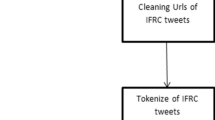Abstract
Forests are the most important part of nature that provides the global balance within the ecosystem. Therefore, wildfires are one of the natural disasters that mostly affect the ecological balance. As an interdisciplinary study, the aim of this study is to measure the reactions of users by classifying comments about wildfires on Twitter with machine learning methods and to investigate the measures against wildfires. In the study, the user comments on wildfires were used on Twitter, which is used by all segments of the society and provides data analysis. A pre-processing has been firstly made for the comments about wildfires by performing word-based text analysis. Sentiment analysis has been realized as positive, negative, and neutral. Moreover, each sentiment group has been evaluated by dividing into four mostly expressed categories. The classification model accuracies have been compared by analyzing with the standard statistical scales. In the study, 58% of Twitter users wish that the wildfires would be ended immediately, approximately 34% of users think that firefighting related to government is enough, 7% of users think that the firefighting is insufficient. Moreover, all Twitter users have frequently referred to firefighting, global warming, support, and sabotage probability in their comments for wildfires. This research supported with sentiment analysis, reveals that wildfires create an alarming situation for all segments of society and it is necessary to act together against wildfires.
Access this chapter
Tax calculation will be finalised at checkout
Purchases are for personal use only
Similar content being viewed by others
References
İmamoğlu, S., Atik, C., Karademir, A.: Microbial problems in paper and paperboard mills using recovered paper as raw material. Kafkas Univ. J. Artvin Forest. Faculty 6(1–2), 179–190 (2005)
Baysal, İ, Uçarlı, Y., Bilgili, E.: Forest fires and birds. Kastamonu Univ. J. Forest. Faculty 17(4), 543–553 (2017)
Beşli, N., Tenekeci, M.E.: Prediction of wildfire using decision trees from satellite data. Dicle Univ. J. Eng. 11(3), 899–906 (2020)
Çoşkuner, K.A.: Assessing forest fires in the North Eastern Anatolia with long term meteorological parameters. Artvin Çoruh Univ. J. Nat. Hazards Environ. 7(2), 374–381 (2021)
Küçükosmanoğlu, A.: İstatistiklerle Türkiye’de Orman Yangınları. İstanbul Üniv. Orman Fakültesi 37(3), 103–106 (1987)
Twitter: #OrmanYangınları, #ormanyanginlari [#WildFires]. Twitter International Company. Accessed July – August 2021
Prakruthi, V., Sindhu, D., Anupama Kumar, S.: Real time sentiment analysis of twitter posts. In: 2018 3rd International Conference on Computational Systems and Information Technology for Sustainable Solutions (CSITSS), pp. 29–34. IEEE, Bengaluru, India (2018)
Baker, O., Liu, J., Gosai, M., Sitoula, S.: Twitter sentiment analysis using machine learning algorithms for COVID-19 outbreak in New Zealand. In: 11th International Conference on System Engineering and Technology (ICSET), pp. 286–291. IEEE, Shah Alam, Malaysia (2021)
Diwakar, D., Kumar, R., Gour, B., Khan, A. U.: Proposed machine learning classifier algorithm for sentiment analysis. In: 2019 Sixteenth International Conference on Wireless and Optical Communication Networks (WOCN), pp. 1–6. IEEE, Bhopal, India (2019)
Ramanathan, V., Meyyappan, T.: Twitter text mining for sentiment analysis on people’s feedback about Oman tourism. In: 2019 4th MEC International Conference on Big Data and Smart City (ICBDSC), pp. 1–5. IEEE, Muscat, Oman (2019)
El-Rahman, S.A., Al-Otaibi, F.A., Al-Shehri, W.A.: Sentiment analysis of twitter data. In: 2019 International Conference on Computer and Information Sciences (ICCIS), pp. 1–4. IEEE, Sakaka, Saudi Arabia (2019)
Hassan, R., Islam, M. R.: Impact of sentiment analysis in fake online review detection. In: 2021 International Conference on Information and Communication Technology for Sustainable Development (ICICT4SD), pp. 21–24. IEEE, Dhaka, Bangladesh (2021)
Jiang, L., Suzuki, Y.: Detecting hate speech from tweets for sentiment analysis. In: 2019 6th International Conference on Systems and Informatics (ICSAI), pp. 671–676. IEEE, Shanghai, China (2019)
Vanaja, S., Belwal, M.: Aspect-level sentiment analysis on e-commerce data. In: 2018 International Conference on Inventive Research in Computing Applications (ICIRCA), pp. 1275–1279. IEEE, Coimbatore, India (2018)
Woldemariam, Y.: Sentiment analysis in a cross-media analysis framework. In: 2016 IEEE International Conference on Big Data Analysis (ICBDA), pp. 1–5. IEEE, Hangzhou, China (2016)
Pholo, M.D., Hamam, Y., Khalaf, A., Du, C.: Combining TD-IDF with symptom features to differentiate between lymphoma and tuberculosis case reports. In: 2019 IEEE Global Conference on Signal and Information Processing (GlobalSIP), pp. 1–4. IEEE, Ottawa, ON, Canada (2019)
AlSalman, H.: An improved approach for sentiment analysis of Arabic tweets in twitter social media. In: 2020 3rd International Conference on Computer Applications and Information Security (ICCAIS), pp. 1–4. IEEE, Riyadh, Saudi Arabia (2020)
Wagh, R., Punde, P.: Survey on sentiment analysis using twitter dataset. In: 2018 Second International Conference on Electronics, Communication and Aerospace Technology (ICECA), pp. 208–211. IEEE, Coimbatore, India (2018)
Mandloi, L., Patel, R.: Twitter sentiments analysis using machine learning methods. In: 2020 International Conference for Emerging Technology (INCET), pp. 1–5. IEEE, Belgaum, India (2020)
Djatmiko, F., Ferdiana, R., Faris, M.: Review of sentiment analysis for Non-English language. In: 2019 International Conference of Artificial Intelligence and Information Technology (ICAIIT), pp. 448–451. IEEE, Yogyakarta, Indonesia (2019)
Dharaiya, S., Soneji, B., Kakkad, D., Tada, N.: Generating positive and negative sentiment word clouds from e-commerce product reviews. In: 2020 International Conference on Computational Performance Evaluation (ComPE), pp. 459–463. IEEE, Shillong, India (2020)
Author information
Authors and Affiliations
Corresponding author
Editor information
Editors and Affiliations
Rights and permissions
Copyright information
© 2022 ICST Institute for Computer Sciences, Social Informatics and Telecommunications Engineering
About this paper
Cite this paper
Yayla, R., Bilgin, T.T. (2022). User Reactions About Wildfires on Twitter. In: Seyman, M.N. (eds) Electrical and Computer Engineering. ICECENG 2022. Lecture Notes of the Institute for Computer Sciences, Social Informatics and Telecommunications Engineering, vol 436. Springer, Cham. https://doi.org/10.1007/978-3-031-01984-5_1
Download citation
DOI: https://doi.org/10.1007/978-3-031-01984-5_1
Published:
Publisher Name: Springer, Cham
Print ISBN: 978-3-031-01983-8
Online ISBN: 978-3-031-01984-5
eBook Packages: Computer ScienceComputer Science (R0)




